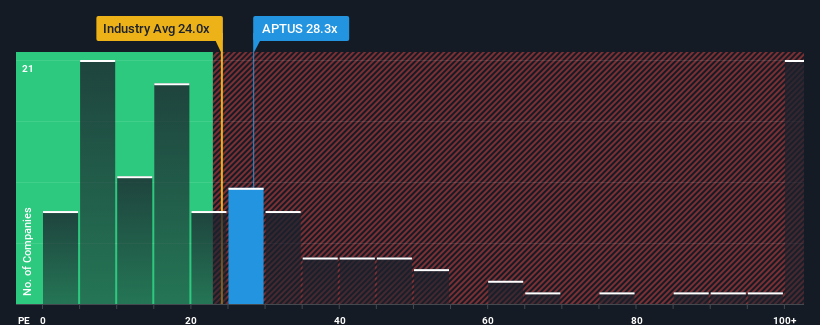- India
- /
- Diversified Financial
- /
- NSEI:APTUS
Aptus Value Housing Finance India Limited's (NSE:APTUS) P/E Is On The Mark
It's not a stretch to say that Aptus Value Housing Finance India Limited's (NSE:APTUS) price-to-earnings (or "P/E") ratio of 28.3x right now seems quite "middle-of-the-road" compared to the market in India, where the median P/E ratio is around 29x. However, investors might be overlooking a clear opportunity or potential setback if there is no rational basis for the P/E.
There hasn't been much to differentiate Aptus Value Housing Finance India's and the market's earnings growth lately. The P/E is probably moderate because investors think this modest earnings performance will continue. If this is the case, then at least existing shareholders won't be losing sleep over the current share price.
View our latest analysis for Aptus Value Housing Finance India

Is There Some Growth For Aptus Value Housing Finance India?
Aptus Value Housing Finance India's P/E ratio would be typical for a company that's only expected to deliver moderate growth, and importantly, perform in line with the market.
Retrospectively, the last year delivered an exceptional 21% gain to the company's bottom line. Pleasingly, EPS has also lifted 106% in aggregate from three years ago, thanks to the last 12 months of growth. Accordingly, shareholders would have probably welcomed those medium-term rates of earnings growth.
Looking ahead now, EPS is anticipated to climb by 20% each year during the coming three years according to the analysts following the company. That's shaping up to be similar to the 20% per annum growth forecast for the broader market.
With this information, we can see why Aptus Value Housing Finance India is trading at a fairly similar P/E to the market. It seems most investors are expecting to see average future growth and are only willing to pay a moderate amount for the stock.
The Key Takeaway
It's argued the price-to-earnings ratio is an inferior measure of value within certain industries, but it can be a powerful business sentiment indicator.
As we suspected, our examination of Aptus Value Housing Finance India's analyst forecasts revealed that its market-matching earnings outlook is contributing to its current P/E. At this stage investors feel the potential for an improvement or deterioration in earnings isn't great enough to justify a high or low P/E ratio. It's hard to see the share price moving strongly in either direction in the near future under these circumstances.
Before you take the next step, you should know about the 2 warning signs for Aptus Value Housing Finance India (1 shouldn't be ignored!) that we have uncovered.
It's important to make sure you look for a great company, not just the first idea you come across. So take a peek at this free list of interesting companies with strong recent earnings growth (and a low P/E).
New: Manage All Your Stock Portfolios in One Place
We've created the ultimate portfolio companion for stock investors, and it's free.
• Connect an unlimited number of Portfolios and see your total in one currency
• Be alerted to new Warning Signs or Risks via email or mobile
• Track the Fair Value of your stocks
Have feedback on this article? Concerned about the content? Get in touch with us directly. Alternatively, email editorial-team (at) simplywallst.com.
This article by Simply Wall St is general in nature. We provide commentary based on historical data and analyst forecasts only using an unbiased methodology and our articles are not intended to be financial advice. It does not constitute a recommendation to buy or sell any stock, and does not take account of your objectives, or your financial situation. We aim to bring you long-term focused analysis driven by fundamental data. Note that our analysis may not factor in the latest price-sensitive company announcements or qualitative material. Simply Wall St has no position in any stocks mentioned.
About NSEI:APTUS
Aptus Value Housing Finance India
Together with its subsidiary, Aptus Finance India Private Limited, provides housing finance solutions in India.
Good value with reasonable growth potential.
Similar Companies
Market Insights
Community Narratives




